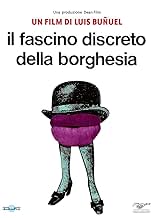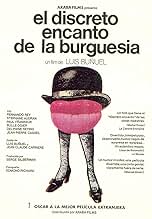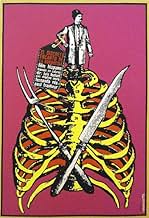Le charme discret de la bourgeoisie
- 1972
- Tous publics
- 1h 42min
NOTE IMDb
7,7/10
49 k
MA NOTE
Une série de rêves surréalistes, concentrés sur six personnes de la petite bourgeoisie et leurs tentatives constamment interrompues de prendre un repas ensemble.Une série de rêves surréalistes, concentrés sur six personnes de la petite bourgeoisie et leurs tentatives constamment interrompues de prendre un repas ensemble.Une série de rêves surréalistes, concentrés sur six personnes de la petite bourgeoisie et leurs tentatives constamment interrompues de prendre un repas ensemble.
- Réalisation
- Scénario
- Casting principal
- Récompensé par 1 Oscar
- 7 victoires et 9 nominations au total
Stéphane Audran
- Alice Sénéchal
- (as Stephane Audran)
Avis à la une
I am surprised that nobody recognized what the author wanted to say with this movie. The whole movie (except the last few minutes) is a dream of one ordinary man. He probably went to sleep without having dinner, and in his dream he pass through various situations where he and his friends intend to eat. But, they were interrupted every time, and he did not manage to have his meal at all. The reasons are every time stranger and stranger. Finally he woke up, goes to the kitchen and took from his refrigerator everything he find's. In one sentence, this movie is about our lust for eating. Simple, but extraordinary.
La Charme Discret de la Bourgeoisie is a celebrated film by a well-regarded surrealist auteur. Given that, and given my taste for such things, I went in with high hopes. But I rarely found it more than mildly amusing.
It's undeniably clever. Bunuel's dry humor sparkles, and his gentle social critique hits its marks more often than not. The penultimate shot of Fernando Rey with a slice of ham stuffed in his mouth is one of the funniest and most memorable cinematic images I've encountered in quite a while. And Delphine Seyrig breezes through her scenes with hilariously blithe detachment. But the parts don't quite add up to a greater whole.
The film reaches its peak about halfway through, once a pattern has been established (dinner parties will be attended, but dining will be teasingly withheld) and the central narrative has begun to digress and fragment. As the surreal intrudes upon the quotidian, a delicious sort of suspense sets in. Pity, then, that the last forty-five minutes squander this tension, retreating to tepid farce and a rather obvious critique of upper-crust social mores.
Someone on the film's board once quoted the director as saying, "the bourgeois moral is the immoral thing for me, that which should be combated; the moral founded in our unjust social institutions as the religion, the homeland, the family, the culture, in short, the so-called pillars of the society." Thematically, the film consists of variations on this familiar counter-cultural conceit, and such thinking was certainly voguish in the late 60s and early 70s. It's an interesting and potentially valid argument, but I found the film's handling of the idea superficial, even clichéd.
The same could be said, I suppose, of El Topo or Sweet Movie, but those films transcend glib adherence to fashionable ideologies and period style. I don't think La Charme Discret does that. Of course, it's more an urbane, low-key comedy of manners than a flaming art-bomb thrown through the window of middlebrow complacency, so perhaps the comparison is unfair. As a comedy, it is appealing, in a mild sort of way.
Finally, I was disappointed by the film's look. I understand that the bland stage-set dining rooms are a device, and a successful one. But surreal detours aside, there isn't much to look at. The camera placements and movements are almost ploddingly ordinary, and while they capture the events adequately, they don't do anything interesting with them.
I'm being unkind, of course, and terribly unfair. By stressing these complaints, I'm giving short shrift the wonderful performances and amusingly understated comic dialog. I'm overlooking the fabulously eerie dream sequences and Bunuel's masterful control of tone. I gave La Charme Discret a 7/10 because it IS charming, funny and somewhat intellectually intriguing. But I still came out of the experience feeling a bit let down...
It's undeniably clever. Bunuel's dry humor sparkles, and his gentle social critique hits its marks more often than not. The penultimate shot of Fernando Rey with a slice of ham stuffed in his mouth is one of the funniest and most memorable cinematic images I've encountered in quite a while. And Delphine Seyrig breezes through her scenes with hilariously blithe detachment. But the parts don't quite add up to a greater whole.
The film reaches its peak about halfway through, once a pattern has been established (dinner parties will be attended, but dining will be teasingly withheld) and the central narrative has begun to digress and fragment. As the surreal intrudes upon the quotidian, a delicious sort of suspense sets in. Pity, then, that the last forty-five minutes squander this tension, retreating to tepid farce and a rather obvious critique of upper-crust social mores.
Someone on the film's board once quoted the director as saying, "the bourgeois moral is the immoral thing for me, that which should be combated; the moral founded in our unjust social institutions as the religion, the homeland, the family, the culture, in short, the so-called pillars of the society." Thematically, the film consists of variations on this familiar counter-cultural conceit, and such thinking was certainly voguish in the late 60s and early 70s. It's an interesting and potentially valid argument, but I found the film's handling of the idea superficial, even clichéd.
The same could be said, I suppose, of El Topo or Sweet Movie, but those films transcend glib adherence to fashionable ideologies and period style. I don't think La Charme Discret does that. Of course, it's more an urbane, low-key comedy of manners than a flaming art-bomb thrown through the window of middlebrow complacency, so perhaps the comparison is unfair. As a comedy, it is appealing, in a mild sort of way.
Finally, I was disappointed by the film's look. I understand that the bland stage-set dining rooms are a device, and a successful one. But surreal detours aside, there isn't much to look at. The camera placements and movements are almost ploddingly ordinary, and while they capture the events adequately, they don't do anything interesting with them.
I'm being unkind, of course, and terribly unfair. By stressing these complaints, I'm giving short shrift the wonderful performances and amusingly understated comic dialog. I'm overlooking the fabulously eerie dream sequences and Bunuel's masterful control of tone. I gave La Charme Discret a 7/10 because it IS charming, funny and somewhat intellectually intriguing. But I still came out of the experience feeling a bit let down...
There are not many artists who could tell the same joke over and over again and get away with it creating the film as brilliant, funny, absurd, witty, and clever as Buñuel's "The Discreet Charm of the Bourgeoisie", 1972. The story of six friends who try to arrange and have a nice dinner together but cannot complete (or even start) their meal does not sound very exiting but wait until you watch this comedy. I've always known how interesting surrealism is but I never thought how funny it could be. I've seen the film four or five times - it only gets better with each viewing. Highly recommended.
9.5/10.
9.5/10.
Director Luis Bunuel is often described as a surrealist, but the word misapplied in reference to his later works, where the the term absurdism is much more appropriate. Such is the case with the Academy Award-winning THE DISCREET CHARM OF THE BOURGEOISIE, which begins with four friends who arrive at their hosts' home only to discover they have arrived on the wrong night--a plausible situation. But before the film has run its course, Bunuel unravels his tale of a meal that never quite happens in the most unexpected ways imaginable.
The film works on several levels, mocking social conventions, the church, and eventually spilling its action into a series of overlapping nightmares in which various attempts to dine are frustrated by everything from the corpse of a restaurant manager in a nearby room to military maneuvers. On one memorable occasion, the friends are invited to dine and are seated around an elegant table--when a curtain suddenly rises behind them and reveals them to be seated on a stage before a hostile audience! The cast (which features Fernando Rey, Delphine Seyrig, Paul Frankeur, Bulle Ogier, Stephane Audran and Jean-Pierre Cassel as the constantly frustrated diners) plays with considerable aplomb, performing the most irrational scenes with a magnificent realism. When combined with Bunuel's absurdist story, the result is a disquieting yet often very funny discourse on frustrated appetites both real and imagined, and with many layers of incidental meaning along the way.
A word of caution to the uninitiated: Bunuel is not for those who seek a tidy plot line with clear-cut meanings. But if you come to it with an open mind, you'll find plenty of food for thought!
Gary F. Taylor, aka GFT, Amazon Reviewer
The film works on several levels, mocking social conventions, the church, and eventually spilling its action into a series of overlapping nightmares in which various attempts to dine are frustrated by everything from the corpse of a restaurant manager in a nearby room to military maneuvers. On one memorable occasion, the friends are invited to dine and are seated around an elegant table--when a curtain suddenly rises behind them and reveals them to be seated on a stage before a hostile audience! The cast (which features Fernando Rey, Delphine Seyrig, Paul Frankeur, Bulle Ogier, Stephane Audran and Jean-Pierre Cassel as the constantly frustrated diners) plays with considerable aplomb, performing the most irrational scenes with a magnificent realism. When combined with Bunuel's absurdist story, the result is a disquieting yet often very funny discourse on frustrated appetites both real and imagined, and with many layers of incidental meaning along the way.
A word of caution to the uninitiated: Bunuel is not for those who seek a tidy plot line with clear-cut meanings. But if you come to it with an open mind, you'll find plenty of food for thought!
Gary F. Taylor, aka GFT, Amazon Reviewer
In Paris, the ambassador Don Rafael Acosta (Fernando Rey) of the South American country Miranda, who is also an smuggler of cocaine, comes to a dinner part in the house of Henri (Jean-Pierre Cassel) and Alice Sénéchal (Stephane Audran) with their common friends M. Thevenot (Paul Frankeur), his wife Simone Thévenot (Delphine Seyrig) and her sister Florence (Bulle Ogier) but on the day before the scheduled. Henri is not at home and they invite Alice to go with them to a restaurant close to her house, but an incident does not allow them to have meal together in the place. They reschedule another meal together many times, but problems occur in every occasion and they do not succeed in their intent.
"Le Charme Discret de la Bourgeoisie" is one of the funniest movies of the master of the surrealism Luis Buñuel. This intellectual director was a great critic of the values of the Bourgeoisie Class and this movie is a witty joke, blurring the fears this class with reality and nightmare, and open to the most different interpretations. The empty, hypocrite and pointless existence of the Bourgeoisie Class is highlighted by the shallow interest of the characters in meal, sex, etiquette and money and their final journey to nowhere; or the behavior of the disloyal ambassador that betrays his friend having a love affair with his wife; smuggles cocaine using his diplomatic immunity; or shoots the toy of a terrorist in front of the Embassy of Miranda. Further, in 1972, the countries of South America lived under military dictatorship with many exiled people living in Paris, and the arrogant Don Rafael Acosta is hilarious denying the truth about his country. Buñuel does not spare the church in his satire, with the funny Monsignor Dufour trying to interfere in every subject without the appropriate knowledge. My vote is eight.
Title (Brazil): "O Discreto Charme da Burguesia" ("The Discreet Charm of the Bourgeoisie")
"Le Charme Discret de la Bourgeoisie" is one of the funniest movies of the master of the surrealism Luis Buñuel. This intellectual director was a great critic of the values of the Bourgeoisie Class and this movie is a witty joke, blurring the fears this class with reality and nightmare, and open to the most different interpretations. The empty, hypocrite and pointless existence of the Bourgeoisie Class is highlighted by the shallow interest of the characters in meal, sex, etiquette and money and their final journey to nowhere; or the behavior of the disloyal ambassador that betrays his friend having a love affair with his wife; smuggles cocaine using his diplomatic immunity; or shoots the toy of a terrorist in front of the Embassy of Miranda. Further, in 1972, the countries of South America lived under military dictatorship with many exiled people living in Paris, and the arrogant Don Rafael Acosta is hilarious denying the truth about his country. Buñuel does not spare the church in his satire, with the funny Monsignor Dufour trying to interfere in every subject without the appropriate knowledge. My vote is eight.
Title (Brazil): "O Discreto Charme da Burguesia" ("The Discreet Charm of the Bourgeoisie")
Le saviez-vous
- AnecdotesThe movie includes three of Luis Buñuel's recurring dreams: a dream of being on stage and forgetting his lines, a dream of meeting his dead cousin in the street and following him into a house full of cobwebs, and a dream of waking up to see his dead parents staring at him.
- GaffesAfter Rafael gives the terrorist champagne, his position in the chair changes between shots.
- Citations
Rafael Acosta: You're much better suited for making love than for making war. Vamos, muchacha. Vamos.
- ConnexionsFeatured in Pour le cinéma: Épisode datant du 16 septembre 1972 (1972)
Meilleurs choix
Connectez-vous pour évaluer et suivre la liste de favoris afin de recevoir des recommandations personnalisées
- How long is The Discreet Charm of the Bourgeoisie?Alimenté par Alexa
Détails
- Date de sortie
- Pays d’origine
- Site officiel
- Langues
- Aussi connu sous le nom de
- El discreto encanto de la burguesía
- Lieux de tournage
- Société de production
- Voir plus de crédits d'entreprise sur IMDbPro
Box-office
- Budget
- 800 000 $US (estimé)
- Montant brut aux États-Unis et au Canada
- 82 471 $US
- Week-end de sortie aux États-Unis et au Canada
- 6 075 $US
- 26 juin 2022
- Montant brut mondial
- 103 230 $US
Contribuer à cette page
Suggérer une modification ou ajouter du contenu manquant




































